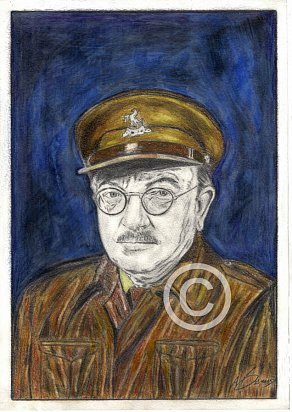Arthur Lowe
Pencil Portrait by Antonio Bosano.

Shopping Basket
The quality of the prints are at a much higher level compared to the image shown on the left.
Order
A3 Pencil Print-Price £45.00-Purchase
A4 Pencil Print-Price £30.00-Purchase
*Limited edition run of 250 prints only*
All Pencil Prints are printed on the finest Bockingford Somerset Velvet 255 gsm paper.
P&P is not included in the above prices.

Recommended viewing
Mum's Army ( Broadcast 20/11/70)
My Brother & I (Broadcast 26/12/1975)
Car along the Pass (ITV 1977)
https://antoniobosano.com/film/anton-diffring.php
Co-starring Anton Diffring and reviewed on his page.
The Plank (1979)
As much as I have always loved the original version of “The Plank,” this 1979 television remake for the ITV network actually works better as a truncated thirty minute special. The laughs come faster,and some of Syke’s additional scriptwriting is peerless. Like the original, it has an all-star cast of British comedians and other celebrities; although only Sykes, Jimmy Edwards and Kenny Lynch would reprise their previous roles from twelve years earlier.
Although not literally a silent film, it has little spoken dialogue. Instead the film is punctuated by grunts, other vocal noises and sound effects. Best of all, there’s Arthur Lowe as Sykes’ hapless colleague, and all too befuddled by everything happening around him. In an early scene, he remains confounded by his colleague’s ‘invisible’ coat hanger, touching the wall with his hand in sheer disbelief after his coat falls on the floor. Clearly satisfied that the handle he cannot see will only work for someone else, he shrugs his shoulders and moves on! It’s classic Lowe.
Finding that a pair of children have purloined their last floorboard to use as a see-saw, our intrepid pair of builders head out to purchase a replacement plank. What follows is a rollercoaster ride as they attempt to get it back onsite through busy streets. However, as they discover, more and more children have been busy with their floorboards in their absence………………
This 1979 television version deservedly won the prize at the 1980 Festival Rose d’Or, held in Montreux, Switzerland.


Comments
Arthur Lowe’s greatest skill was his timing. It was faultless. He could get huge laughs with such simple lines as “Just a moment,” “how dare you,” and “you stupid boy.”
He was a very kind man and would go out of his way to help actors less fortunate than himself. When he died suddenly in 1982 at the age of sixty six, many mourned his passing, yet in reality, his talent burns even brighter today more than thirty years on. Perhaps it’s the raft of second rate 21st century comedy that pales in comparison to his very best work, or merely the way he effortlessly personified those traditional English values of chivalry, stoicism, nationalism, pomposity, class consciousness, and honesty.
Whatever the reason, he remains one of the true celluloid greats. It goes without saying that I’ve watched him virtually my entire life, and despite repeated viewings, there’s always a fresh nuance to enjoy in his screen portrayal – that knowing look, the subtle preening of his moustache, or best of all, his look of sheer incredulity. Even in his minutest supporting roles, he could always be relied upon to pull the rug from under the feet of bigger names.
He should have hung around another twenty years – an investiture at Buckingham Palace would have sat well with him – but as it is, he will remain a national treasure, an actor to be enjoyed by future generations to come. It’s the very least he deserves.
Intuitively brilliant, he never needed long to make his mark, enlivening even such a downbeat film as “This Sporting life” (1963), by flashing a wide grin at Richard Harris and asking the young rugby wing half what he thinks of his teeth. Later in the film, and perturbed that the wife of the club owner might have predatory designs on the young man, he enquires in that inimitable fashion of his:
“Tell me, Frank. Have you been indulging in what I call Mrs. Weaver’s weakness for social informalities?”
Under construction
At the heart of “Dad’s Army” was the class war between Mainwaring the jumped-up bank manager, and Wilson, the super-smooth, aristocratic bank clerk who agrees to be Sergeant, although he is so much smarter than the boss. It’s clever writing. You feel for Mainwaring as he rails against Wilson’s air of superiority but you also feel for Wilson, having to serve this idiot. There is no doubt, though, that they would die for each other